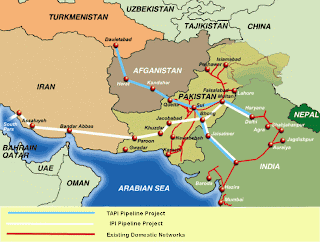Despite support from both the United States and the Asian Development Bank, potential investors are backing away from the proposed Turkmenistan-Afghanistan-Pakistan-India (TAPI) natural gas pipeline. This proposal has been beset with concerns over security of the pipeline route, which passes through some of the most violent prone provinces in Afghanistan.
In the latest development, China has expressed new interest in Turkmen gas. First, Chinese President Hu Jintao has proposed a new pipeline route that would bring Turkmen gas to China via Afghanistan. The benefit of this latest proposal is that the pipeline route would traverse a safer route in Northern Afghanistan. Second, China also signed in May 2012 an agreement with Turkmenistan to increase deliveries through the East-West Gas Pipeline from 30 bcm per year to 65 bcm. This pipeline does not pass through Afghanistan, has no security isues, and has been relatively trouble free since it opened in 2009. Finally, China has assured Turkmenistan that its demand for natural gas will constantly increase over the next five years. As a result, Turkmenistan's enthusiasm has "softened" for TAPI, according to Pakistani correspondent Iqrar Haroon.
The Russian National Energy Institute has recommended the Russian government should avoid investing in TAPI because of security concerns, and questions over the viability of the project. According to the Indian Institute for Defence Studies and Analyses, the proposed increases in Chinese purchases of Turkmen gas will have a negative impact on Russia. Turkmenistan offers lower-priced gas to China, bringing downward pressure on Russian gas prices. Russia and China have been in talks since at least June 2009 to import 68 bcm of gas per year, but have not been able to agree on a price.
In the latest development, China has expressed new interest in Turkmen gas. First, Chinese President Hu Jintao has proposed a new pipeline route that would bring Turkmen gas to China via Afghanistan. The benefit of this latest proposal is that the pipeline route would traverse a safer route in Northern Afghanistan. Second, China also signed in May 2012 an agreement with Turkmenistan to increase deliveries through the East-West Gas Pipeline from 30 bcm per year to 65 bcm. This pipeline does not pass through Afghanistan, has no security isues, and has been relatively trouble free since it opened in 2009. Finally, China has assured Turkmenistan that its demand for natural gas will constantly increase over the next five years. As a result, Turkmenistan's enthusiasm has "softened" for TAPI, according to Pakistani correspondent Iqrar Haroon.
The Russian National Energy Institute has recommended the Russian government should avoid investing in TAPI because of security concerns, and questions over the viability of the project. According to the Indian Institute for Defence Studies and Analyses, the proposed increases in Chinese purchases of Turkmen gas will have a negative impact on Russia. Turkmenistan offers lower-priced gas to China, bringing downward pressure on Russian gas prices. Russia and China have been in talks since at least June 2009 to import 68 bcm of gas per year, but have not been able to agree on a price.
